Army Vietnam War Coal City, IL Flight date: 10/19/22
By Frank Hauenschild, Honor Flight Chicago Veteran Interview Volunteer
Prior to being drafted, Charles “Sam” Merritt, had a fairly routine upbringing. Being the third born of six children of Charles and Mary Merritt, Sam grew up in New Haven, Illinois. Attending Ridgeway High School for three years and then graduating from Crossville High School, Sam worked summers at a local gas station and then worked at a sawmill in which he often drove a log truck.
Receiving his “Greetings” letter from the draft board, Sam traveled to St. Louis for his pre-induction physical, which qualified him for service to our country. In June of 1967, Sam reported for Basic Training at Fort Leonard Wood, Missouri. After completing his Basic Training, Sam was sent to Fort Polk for his Advanced Infantry Training. From Ft. Polk, Sam was ordered to Hawaii where he was assigned to a newly formed battalion. Arriving at Schofield Barracks on the island of Oahu, Sam continued his training with the new battalion. “One of my most interesting assignments while at Schofield was being the payroll guard for Captain Daniel Treadwell.” Sam related that everyone was paid in cash while he was in Hawaii. “I would stand guard and watch Captain Treadwell count out payroll for his troops,” Sam related.
After a few months in Hawaii, and being assigned as a squad leader, Sam was ordered to Vietnam, arriving at Chu Lai, 39 miles southeast of Da Nang. Sam was then detailed to Duc Pho Base Camp, where he would remain for the duration of his tour in Vietnam. Sam related that Duc Pho was a large camp which had an air strip, a hospital, barracks and a well-stocked mess hall.
From Duc Pho, Sam’s unit would be assigned to various patrols in the field. Sam stated that most often they would march from Duc Pho, usually on “search and destroy” missions. While on patrol, Sam related that they would be out for periods of time up to three or more weeks. “We would go anywhere, sometimes following a lead from a recon patrol, but we were always moving.” On many patrols, Sam’s unit would find stores of weapons, ammunition and food supplies. We would find all sorts of interesting items while on patrols. He recalled his unit finding a stash of brand-new AR-47s still boxed away at one location. Another patrol from Duc Pho found an ammo can filled with fifty U.S. paper bills. “When the ammo can was brought back to camp, they counted the money and it totaled $150,000.00!” Sam recalled. He had no idea how these items turned up in the hands of the enemy, but he assumed, with knowledge, the “black market” in Vietnam was alive and doing well.
“I was a tunnel rat while on many patrols” tells Sam. He stated that “tunnel” duty was mostly voluntary while on patrols. The tunnels in which Sam encountered were small, often used as short-time resting areas or hiding areas when our patrols would come near the enemy. Sam said there were some large and elaborate tunnel systems, mostly in the Saigon area, but he did not encounter many large tunnel systems. “The tunnel openings were well hidden and very tight to enter and to maneuver in.” Sam related that he often volunteered for tunnel duty, being of a smaller build, “but I eventually quit volunteering after I heard of a fellow tunnel rat getting stuck in a tunnel. By the time they got him out, he had suffocated and died.”
The monsoons in Vietnam were the worst, Sam recalled, “We were always wet, from head to toe.” Sam related that the rain gear they were supplied with was a step up from the usual thin poncho. He described the rain gear as having a water-proof shell and hood and an inside liner.” Being out in the field for weeks on end, they would often use the rain gear for constructing make-shift tents. “When it would stop raining, our rain gear dried out pretty quickly due to the inside liners,” Sam recalled. “It was good to get back to base camp after an extended patrol; we could clean-up, rest and have hot meals for a change.” Sam said that in-between patrols, it was pretty low-key in camp. “Although Duc Pho was located in a fairly safe area, we all took turns in the guard bunkers surrounding the camp.”
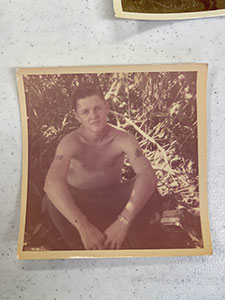
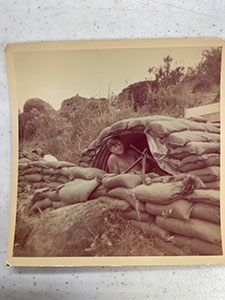
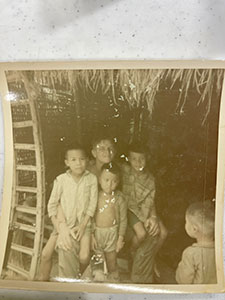
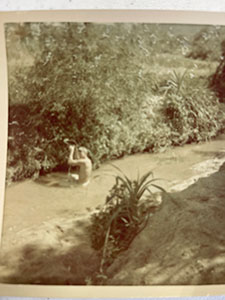
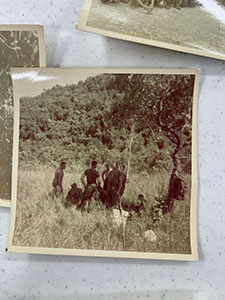
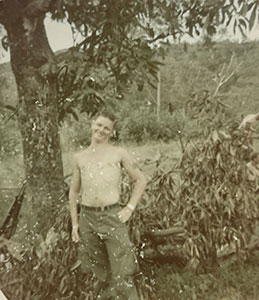
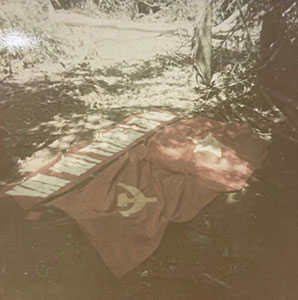
Along with being issued rain and other equipment, being issued new boots were always welcome, but sometimes to the detriment of the infantry soldier. “My new boots were spotted by a sergeant who out-ranked me and commandeered my new boots,” Sam chuckled. Sam related that while the sergeant took his boots, he sent him back to the rear to get replacement boots. “That wasn’t too bad, when I got to the base camp, they had no boots my size and I was there for two weeks.” Sam said that was a good two weeks, “I had hot meals and we were allocated two beers a-day, which were always cold.”
On occasion, Sam’s patrol unit would be transported by helicopter to various locations. Sam recalled a major offensive when a reconnaissance patrol discovered a major NVA encampment. “I had heard that our forces found the encampment on a recon mission when a NVA flag was discovered waving above the camp. It was a mission of force when we approached the camp on foot.” Sam related that the NVA camp was in a mountainous region that was under a triple canopy of jungle. A triple-canopy is dense vegetation on the ground, in the center and ends at the treetop level. Sam explained, “it blocked out all sight from above.” Both Army and Marine divisions began by surrounding the camp in preparation of moving in on the NVA. “But first, due to the vastness of the camp, they let the Air Force soften the area before we entered on foot.” Sam described the air attack as “five days of light.” The airplane gunships, referred as “Puff the Magic Dragon(s)” pounded the camp with bombs, strafed the area with their machine guns and lit up the area with flares all through the night, Sam recalled. The battle lasted five days before the NVA fled the encampment. “It was a huge battle; it took us two days before we began to gain ground in the camp.” Sam explained that it was the largest camp and tunnel system he encountered while in Vietnam. They located their underground mess area, ammunition and weapon storage areas, personnel quarters and a 20 x 20 room that served as their field hospital. “Once we had control, we blew it all up with C4 and other explosives.”
On other patrols, he would experience venturing through many small villages. Sam stated that most of the villages consisted of farmers and people just trying to survive the times. “Most of the people were indifferent to our presence in their country and just continued with their work to survive and make a living.” Sam stated that there was no way they could tell if a village farmer was “NVA” or not, but they were always on their guard and took nothing for granted when patrolling through a village.
The patrols would have to travel through the many rice paddies that were being farmed and also vast open areas. Sam noted that many of the open areas were not natural open areas. “Agent Orange that we dropped on Vietnam, was devastating”, Sam said, shaking his head. Sam said they had to ingest these chemicals while in the field. Sam related that he is currently a Stage 3 cancer survivor and he now receives VA benefits for Agent Orange exposure.
Sam did receive a weeklong R&R leave which he spent in Sydney, Australia. “I ate and slept for a week” with a little sightseeing and nightlife in-between. The interesting part of his trip back to Vietnam was when his plane, filled with troops, developed engine problems. The captain, having two options, decided to let the troops make a choice. The captain said the engine problem was serious but would not affect the plane’s ability to fly. “We can either turn around and fly back to Sydney where they would install a replacement engine and we could head right back to Vietnam, or we can land in Darwin, Australia where the engine could be removed and sent back to Sydney for repair.” Sam said the decision was unanimous, which was to land in Darwin. “We had a great evening with the Aussies; they were great and we didn’t have to buy a drink all night.” Sam believed that it was probably the first and only time U.S. troops were in Darwin.
Sam’s tour of duty in Vietnam ended one-year to the day of his arrival at Chu Lai. “Us single guys had to stick it out for a full year, but the married guys in Schofield Barracks with me got a day-off of their tour for each two days they were stationed in Hawaii. They were going home after being in Vietnam for only nine months,” Sam stated. Feeling very fortunate to leave Vietnam without any major injuries, Sam related that “my only wound in Vietnam was when I was carrying a small puppy in my pocket and the little guy bit my finger!”
Leaving Cam Ranh Bay, he was flown to Fort Lewis, Washington and discharged from the U.S. Army after 1 year, 9 months and 20 days of service. Sam returned to Mt. Vernon to live with his sister. Returning to private life, Sam initially worked on a farm during the summer months and then worked in the coal fields in Kentucky in the fall and winter. Needing a change of scenery, Sam traveled north to Wilmington, Illinois and stayed with his cousin for a time. In 1973, he gained employment with the ExxonMobil Refinery in Channahon, Illinois. After 34 years of employment with ExxonMobil, Sam retired as a supervisor. During his career, Sam served on the Fire Brigade at ExxonMobil and also shared his experience with the Coal City Volunteer Fire Department for eighteen years.
Sam, now fully retired, enjoys life with his wife, Donna, in their home in Coal City.
Thank you Sgt. Charles “Sam” Merritt for your courageous and dedicated service to our country. Enjoy your well-deserved Honor Flight with your fellow veterans!


